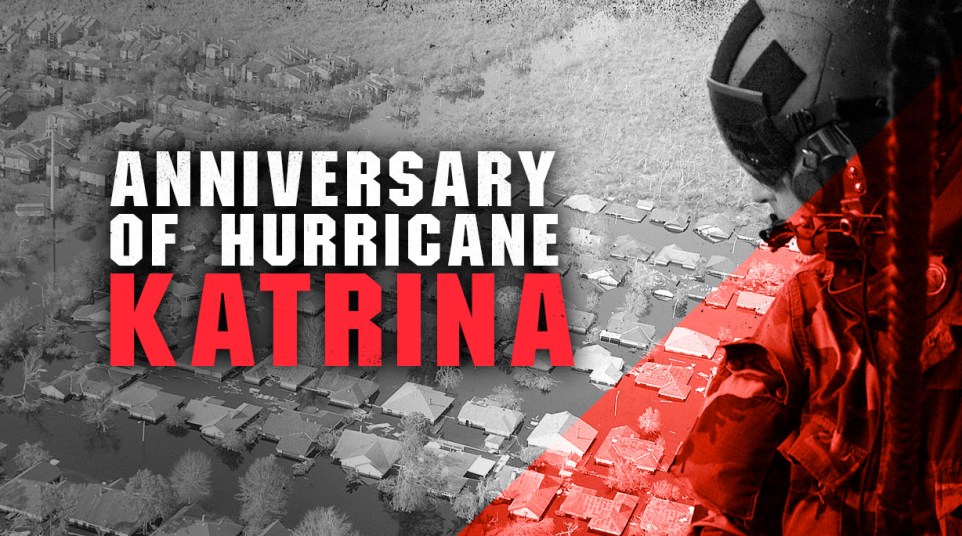Anniversary: Remembering Hurricane Katrina and LSU football, 10 years later
Like most college football fans on Aug. 28, 2005, I was eagerly awaiting a new season. More specifically, I was eager as hell to see the 2005 version of the LSU Tigers.
JaMarcus Russell had the attention of the SEC and the nation. We all wanted to see the giant who could toss a 70-yard bomb and put touch on it.
A week later, the biggest headline about LSU football had nothing to do with football. The news from Baton Rouge centered around famed musician, Fats Domino, who was sleeping on JaMarcus Russell’s couch. These two larger than life stars collided as a result of mother nature landing an uppercut to Southeast Louisiana.
Hurricane Katrina made landfall on Aug. 29, 2005. By Aug. 30, hundreds of thousands of New Orleanians sought shelter after fleeing Katrina’s flood waters … including Fats Domino.
On Aug. 29, 2005, life changed forever in for most everyone in South Louisiana. Katrina did more than just destroy neighborhoods. She deeply affected so many people and left scars that will last a lifetime. Like Fats Domino, I too, became homeless in a matter of hours. The school where I taught and coached also was destroyed, as was the hospital that my wife practiced in. The life we had built together was erased. All we were left with was each other and a mountain of uncertainty.
In addition to the aftermath, it was also difficult dealing with what happened during the storm. My wife and I moved and protected babies that couldn’t even breathe on their own. For 20 hours, I put them and many other patients on helicopters. For the next 24 hours we tended to the infirm. I saw elderly patients lose their battle with the heat. We were evacuated to the convention center. For 10 hours we waited before I saw opportunity for safety and bartered a ride for my group in the back of a box truck. In that short period of time I got to experience the adrenalin rush of being a hero and the desperation of needing a hero.
By Sept. 3, my wife and I were in Shreveport, La., and we didn’t have a clue. Thankfully we were able to stay with my brother’s family, but we had no identity other than being a part of the Katrina diaspora that was now settling down across the United States. I had no anchors to tie me back to what was. Every last portion of my life was floating adrift much like the flood waters still inhabiting my home in Lakeview.
Even my beloved Tigers were upended by this catastrophe. The Fighting Tigers and new coach Les Miles were tending to their own families while still figuring out the damage to their facilities.
It would be another week before LSU played its home opener against Arizona State in Tempe, Ariz., on a Friday. Russell rolled out, hit receiver Early Doucet for a 39-yard touchdown, and the Tigers w0n. For three hours, I had the good opportunity to watch the Tigers play, but every crowd shot reminded me of why I wasn’t in Baton Rouge enjoying the game.
It would be another 16 days before that opportunity came again. That’s no typo. Nothing was normal during this time. The next game wasn’t two weeks later because Hurricane Rita decided to slam into Southwest Louisiana on Sept. 24. LSU pushed its game against the Vols to a Monday night. Yet, come hell or high water I was going to be at that game. Besides, I had already been through the high waters and late summer in Louisiana is pretty darn inferno-ish.
If I was seeking some sort of normalcy via LSU football, this game wasn’t cooperating. All my peculiar game-day traditions were toast. My lucky hat was still submerged, along with the rest of my fan gear. The guys I tailgated with were spread all over kingdom come. I was travelling Southeast to the game instead of Northwest.
Oh, and not to mention … it was still a Monday.
Upon entering Tiger Stadium, it felt and looked the same. I found a little piece of me when I found my seat. However, the atmosphere was still a little unfamiliar and uncertain. Hearing LSU public address announcer Dan Borne proclaim that it was “Monday Night in Death Valley” was and is jarring. The typical frisson or goose flesh that I get from the first few notes of pregame were also absent. I noticed that most of the game-day routine was the same, but I was not.
Then LSU held a moment of silence for victims of Hurricane Katrina and Rita, followed by Fats Domino’s “Walking to New Orleans.”
I would say I held back, but it would be a lie. I lost it. My brother just grabbed my neck and squeezed.
I dropped into my seat to collect myself just in time to hear Borne make the following proclamation: “On this evening, we vow to move forward under a common flag because this is LSU football; this is Tiger Stadium; and this is Louisiana.”
The crowd erupted. I erupted out of my seat. The frisson returned. The passion returned. Then kickoff, and finally, a bit of normalcy returned.
Yes, I had a few new quirks about me, but it seemed LSU had some new quirks as well — namely its quirky new coach, Les Miles, who seemed to not just embrace crazy, but bear hug it.
Ten years later, I appreciate where I am, but lament part of the journey to get here. Yet, like our beloved Tigers, I have experienced many more wins than losses in that time.

